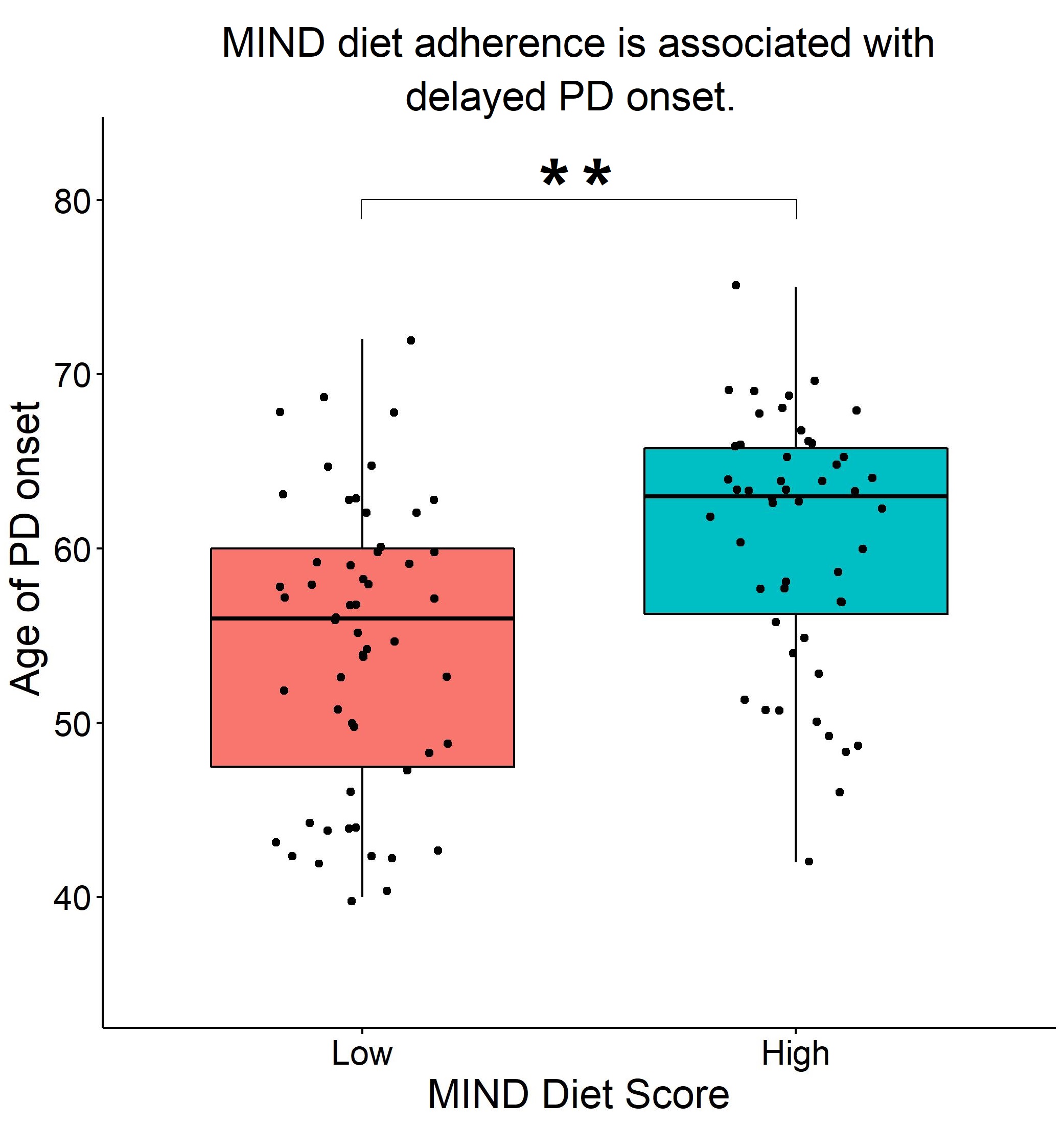Category: Parkinson's Disease: Non-Motor Symptoms
Objective: This study evaluated the impact of MIND diet adherence on Parkinson’s disease (PD) onset and related symptoms.
Background: PD is a common neurodegenerative disease characterized by motor dysfunction, cognitive decline, gastrointestinal alterations, and mood disorders such as anxiety and apathy. The cause of PD remains largely unknown and no neuroprotective medications are available. The Mediterranean-DASH diet Intervention for Neurodegenerative Delay (MIND) diet has previously been shown to reduce the risk of Parkinson’s disease, but correlations between dietary adherence, age of PD onset and other PD-related symptoms require further exploration.
Method: EPIC-Norfolk Food Frequency Questionnaires (FFQ) from 71 control (mean age: 65 years, M:F= 0.6:1) and 142 participants with PD (mean age: 66.5 years, M:F= 1.9:1, mean disease duration 6.0 years) were scored for MIND diet adherence (maximum score = 15). These data were then correlated with both 16S fecal microbiome sequencing data and the severity of mood disorders, motor symptoms, and age of disease onset.
Results: Participants were partitioned into tertiles based on their MIND diet adherence. Stricter adherence to the MIND diet (N=50, score >=8.5) correlated with a delayed disease onset (63 vs. 56 years, p=0.009), shorter disease duration (5 vs. 7 years, p=0.009), and a lower BMI (25.1 vs. 27.1, p=0.002) as compared to age-matched PD participants with lower MIND diet scores (N=55, score <=7.0). In the combined PD and control age-matched cohort, stricter diet adherence correlated with lower Apathy Scale scores (9 vs. 11, p=0.01) and increases in the short-chain fatty acid-producing bacterium Coprococcus (1.1% vs. 1.7% of microbiome, p=0.0007) compared to those with lower diet scores. Several PD-associated microbes were also associated with diet scores, but did not remain significant after FDR correction. Interestingly, Fatigue Severity Scores and Anxiety Scores were inversely proportional to diet scores in the control group only (p=0.01 and p=0.006 respectively). No differences were seen between MIND diet adherence and UPDRS motor scores.
Conclusion: This study demonstrates the MIND diet’s potential as a drug-free neuroprotective strategy in PD that may improve the burden of non-motor PD symptoms and delay the onset of the disease itself.
To cite this abstract in AMA style:
A. Metcalfe-Roach, M. Cirstea, A. Yu, E. Golz, K. Sundvick, D. Kliger, B. Finlay, S. Appel-Cresswell. Higher adherence to MIND diet associated with later onset of Parkinson’s disease [abstract]. Mov Disord. 2020; 35 (suppl 1). https://www.mdsabstracts.org/abstract/higher-adherence-to-mind-diet-associated-with-later-onset-of-parkinsons-disease/. Accessed December 29, 2025.« Back to MDS Virtual Congress 2020
MDS Abstracts - https://www.mdsabstracts.org/abstract/higher-adherence-to-mind-diet-associated-with-later-onset-of-parkinsons-disease/

